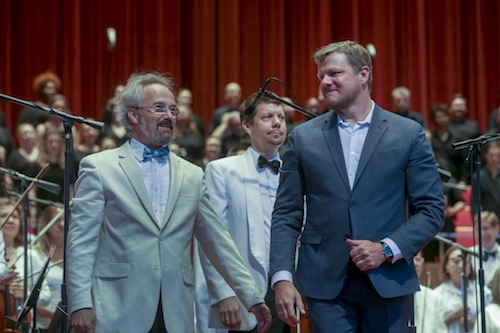“The Pleiades” receives a rousing and effective premiere at Grant Park Music Festival

To its credit, the Grant Park Music Festival manages to debut at least one new work each season, a highly laudable and unusual commitment for a summer music series.
Ēriks Ešenvalds was the commissioned composer this year and Wednesday night’s program at the Pritzker Pavilion brought the world premiere of Ešenvalds’ The Pleiades.
As the title indicates, the Latvian composer takes his inspiration from the bright star cluster that has been a crucial navigational marker for sailors since ancient times. The more specific stimulus comes from the Pleiades’ mythic and cultural influences on various indigenous peoples.
Spanning six sections and nearly a half-hour, The Pleiades is a big and ambitious work, scored for large chorus and substantial orchestral forces.
There are issues. Apart from the opening Tennyson stanza, most of the texts are uninspired to say the least; rather than reflecting the celestial inspiration in a mystical or poetic way, the folkish tales are anchored to a numbing didactic literalism (“Once there were seven little Indian boys, who used to take their bowl of succotash each night and eat their suppers together on a mound outside the village”).
If the words rarely inspire, Ešenvalds’ tonal music for The Pleiades proved attractive, consistently engaging and often glorious, written with confidence and individual flair.
“Prologue: Sunset Song” opens with a rising theme, taken from the Zuni indians of New Mexico, here dressed in a Copland-esque trumpet call, which segues into the full chorus entering on Tennyson’s words (“Many a night I saw the Pleiads”). The ensuing “Nanuk the Bear” brings a faster tempo and forthright robustness in relating an Inuit story.
The third section offers the most indelible music of the work. A “Pawnee Song to the Pleiades” begins in a quiet and almost impressionistic vein, with chimes and folkish high percussion. rattles. Yet in the middle section (“Ah, ‘tis a blessed thing to behold them yonder”) the melodic theme rises to a richly resplendent climax for chorus and orchestra, the sopranos soaring high in a spine-tingling moment.
Then it’s back to terra firma with “Seven Dancers” another mundane Native American text relating how the seven boys were transformed into the Pleiades; the storytelling here is painted in quick, alternating passages by the men and women singers.
The penultimate section (“Seven Sisters of the Sky”) begins with some atmospheric writing for strings and percussion, but is the least interesting vocally with the monophonic choral writing making one wonder if this section fell victim to a deadline.
“Epilogue: Sunrise Call” concludes the work with another Zuni theme, moving from evocative pastoral music for orchestra to a radiant choral climax, the work ending on a brilliantly colored and optimistic coda.
One can’t help thinking that The Pleiades might be more successful if it lost a movement (or two). Yet Ešenvalds’ work made a sure and effective impact in its premiere. Carlos Kalmar and the Grant Park Orchestra put across the brilliantly varied hues of the symphonic writing and Christopher Bell’s Grant Park Chorus delivered Ešenvalds’ music with sensitive refinement and full-blooded commitment as needed. The composer was warmly applauded by the audience on a cool evening, the crowd augmented by a large contingent of professionals in town for this week’s Chorus America conference.
The first half of the evening offered a trio of nicely contrasted, shorter works.
Brahms’ Gesang der Parzen (“Song of the Fates”) opened the evening. The third and final of his works for chorus and orchestra, the 16-minute setting inspired by Goethe’s poem Iphignie is no lost masterpiece, but the chorus gave Brahms’ brand of musical sobriety robust yet flexible advocacy.
The lakefront festival did their part Wednesday for the Leonard Bernstein centenary with the composer’s Chichester Psalms.
Kalmar and the Grant Park Orchestra and Chorus kicked up ample energy in the joyful opening movement, Bernstein’s snappy brass and percussion scoring given full brilliance. The central setting of Psalm 23 largely missed the music’s rapt simplicity, with young soloist Bryce Abend singing cleanly yet with rather blank expression. Bernstein’s finale didn’t quite come off either, missing the sense of gravitas and tragedy surmounted.
The most striking item on the first half was Messiaen’s O Sacrum Convivium. Christopher Bell took the podium to lead this brief a capella antiphon—oddly the deeply religious composer’s only vocal work written for the Catholic church. The Grant Park Chorus’s hushed, glowing performance of this meditative miniature was stunningly beautiful.
The program will be repeated 6:30 p.m. Friday. gpmf.org
Posted in Performances



Posted Jun 26, 2018 at 6:58 am by Saira
“…with young soloist Bryce Abend singing cleanly yet with rather blank expression”
I was so impressed with Bryce’s composure and clear voice. It may interest you to know that he is instructed by the score to sing the solo “simply, without crescendo or diminuendo, without sentimentality”. Blank may be a well-executed solo in this case!